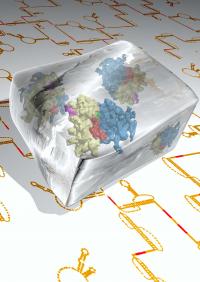
|
 |
Decoding Ribosomal Frameshifting Exploit by HIV and SARS
May 11, 2006, 17:39, Reviewed by: Dr. Priya Saxena
|
|
"This collaborative project was set up with Dr Robert Gilbert's team in Oxford to investigate the structure of a frameshifting ribosome using electron microscopy. The images we obtained give us an insight into how a virus-encoded RNA pseudoknot can induce frameshifting and may be useful in designing new ways to combat virus pathogens that use this process."
|
By Biotechnology and Biological Sciences Research Council,
UK scientists have cracked one of the key biological processes used by viruses such as HIV and SARS when they replicate according to a paper published in the journal Nature on 11 May. Viruses are able to interfere with the host cell processes that our bodies use to replicate cells, and protein synthesis is often one of their targets. For the first time, researchers at the Universities of Cambridge and Oxford have witnessed virus-induced "frameshifting" in action and have been able to identify the crucial role of particular elements.
The research, funded by the Biotechnology and Biological Sciences Research Council (BBSRC), the Medical Research Council (MRC), The Royal Society and The Wellcome Trust, brings us another step closer to understanding the fundamental workings of these devastating viruses.
The scientists have revealed the workings of the process known as 'ribosomal frameshifting' that forces a mis-reading of the genetic code during protein synthesis. The correct expression of most genes depends upon accurate translation of the 'frame' of the genetic code, which has a three nucleotide periodicity. Viruses such as HIV and SARS bring into the cell a special signal that forces the ribosome to back up by one nucleotide, pushing it into another 'frame' and allowing synthesis of different viral proteins. These are exploited by viruses and help them to survive and multiply.
The British researchers successfully imaged frameshifting in action and for the first time observed how a virus encoded element called an RNA pseudoknot interferes with the translation of the genetic code to allow viruses like HIV and SARS to express their own enzymes of replication.
 |
| Mammalian ribosomes caught in the process of frameshifting. The ice block symbolizes the cryo-electron microscopy used to image the ribosomes, the background is a compilation of different viral RNA pseudoknots. (Image Courtesy: BBSRC, Long and Moran.) |
Dr Ian Brierley, the project leader at the University of Cambridge, said: "This collaborative project was set up with Dr Robert Gilbert's team in Oxford to investigate the structure of a frameshifting ribosome using electron microscopy. The images we obtained give us an insight into how a virus-encoded RNA pseudoknot can induce frameshifting and may be useful in designing new ways to combat virus pathogens that use this process."
Professor Julia Goodfellow, Chief Executive of the Biotechnology and Biological Sciences Research Council, which was one of the main funders, said: "This is exciting and valuable research and demonstrates clearly why investment in fundamental science is so important. The treatments and therapies that we now take for granted are based on decades of work by scientists furthering our understanding of natural processes. The work to explore fundamental biology today is laying the foundation for potential medical applications over the next twenty years." 
- Nature Journal, 11 May 2006
www.bbsrc.ac.uk
About BBSRC
The Biotechnology and Biological Sciences Research Council (BBSRC) is the UK funding agency for research in the life sciences. Sponsored by Government, BBSRC annually invests around �336 million in a wide range of research that makes a significant contribution to the quality of life for UK citizens and supports a number of important industrial stakeholders including the agriculture, food, chemical, healthcare and pharmaceutical sectors. http://www.bbsrc.ac.uk
About MRC
The Medical Research Council (MRC) is a national organisation funded by the UK tax-payer. Its business is medical research aimed at improving human health; everyone stands to benefit from the outputs. The research it supports and the scientists it trains meet the needs of the health services, the pharmaceutical and other health-related industries and the academic world. MRC has funded work which has led to some of the most significant discoveries and achievements in medicine in the UK. About half of the MRC's expenditure of approximately �500 million is invested in its 40 Institutes, Units and Centres. The remaining half goes in the form of grant support and training awards to individuals and teams in universities and medical schools.
About The Royal Society
The Royal Society is an independent academy promoting the natural and applied sciences. Founded in 1660, the Society has three roles, as the UK academy of science, as a learned Society, and as a funding agency. It responds to individual demand with selection by merit, not by field. The Society's objectives are to:
* strengthen UK science by providing support to excellent individuals
* fund excellent research to push back the frontiers of knowledge
* attract and retain the best scientists
* ensure the UK engages with the best science around the world
* support science communication and education; and communicate and encourage dialogue with the public
* provide the best independent advice nationally and internationally
* promote scholarship and encourage research into the history of science
About The Wellcome Trust
The Wellcome Trust is the most diverse biomedical research charity in the world, spending about �450 million every year both in the UK and internationally to support and promote research that will improve the health of humans and animals. The Trust was established under the will of Sir Henry Wellcome, and is funded from a private endowment, which is managed with long-term stability and growth in mind.
|
For any corrections of factual information, to contact the editors or to send
any medical news or health news press releases, use
feedback form
Top of Page
|
|
|
|